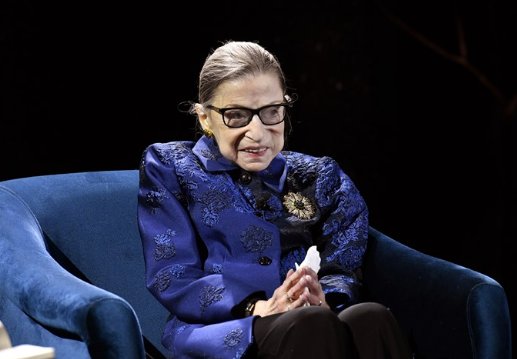Washington: A fierce political battle was shaping up Saturday over the selection of a successor to trailblazing liberal US Supreme Court Justice Ruth Bader Ginsburg, with top Democrats opposing any move by President Donald Trump to nominate her replacement before the November 3 presidential election.
Ginsburg, the senior liberal justice, died Friday night at age 87 of complications from metastatic pancreatic cancer after 27 years on the court. Her death gives Trump, who is seeking re-election November 3, a chance to expand the court’s conservative majority to 6-3 at a time of a gaping political divide in America.
Even as large crowds of mourners gathered outside the Supreme Court building well into the night to pay tribute to the iconic liberal jurist, battle lines were forming. Supreme Court appointments require Senate confirmation, and Trump’s fellow Republicans control the chamber, holding 53 seats of the 100 seats. Democrats lack the votes to block any Trump nominee unless some Republican senators join them.
With the assistance of Senate Majority Leader Mitch McConnell, who has made confirmation of Trump’s federal judicial nominees a top priority, the President potentially could announce a nominee and move rapidly through the confirmation process, which usually takes at least two months.
Even before Ginsburg’s death, Trump had made public a list of potential nominees.
Trump’s Democratic opponent in the Presidential race, Joe Biden, Friday night said the winner of the election should be the one to make the selection and that Trump should not move forward with a nominee. Chuck Schumer, the Senate’s top Democrat, agreed.
McConnell pledged that the Senate would vote on any Trump nominee. If he wins, Biden would be sworn in to replace Trump January 20. Trump focused his initial remarks on praising Ginsburg, who he previously had derided, without specifying his next steps.
For liberals who considered her a heroine, the grief they have expressed over her death was tinged with fear over what happens next.
Conservative activists for years have sought to get enough votes on the Supreme Court to overturn the 1973 Roe v. Wade ruling that legalised abortion nationwide. During the 2016 campaign, Trump promised to appoint justices who would overturn that landmark decision. But the court in July, even with its conservative majority, struck down a restrictive Louisiana abortion law on a 5-4 vote.
The two justices who Trump already has appointed were Neil Gorsuch in 2017 and Brett Kavanaugh in 2018. Kavanaugh’s confirmation process was particularly heated, as he faced accusations by a California university professor, Christine Blasey Ford, that he had sexually assaulted her in 1982 when the two were high school students in Maryland. Kavanaugh angrily denied those accusations and was narrowly confirmed.
Republicans risk the possibility of liberals embracing more radical proposals should Trump replace Ginsburg but Democrats win November’s election, with some activists on the Left suggesting even before Ginsburg’s death that the number of justices on the court should be expanded in order to counter Trump’s appointees.
